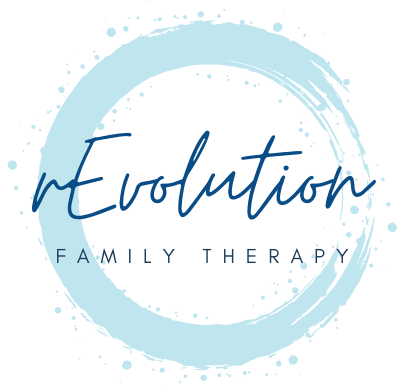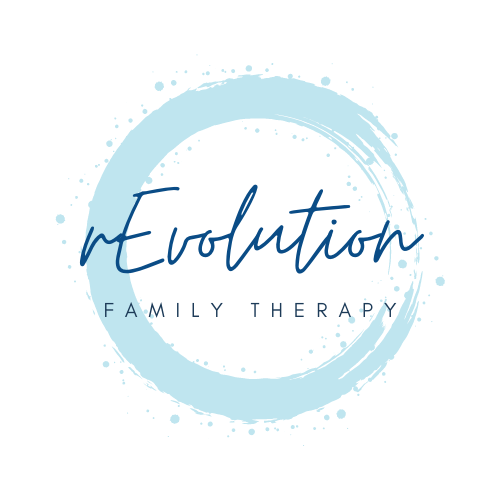rEvolution Family Therapy
You are not alone.
Group Therapy Helps
At first, joining a group of strangers may seem scary, yet group therapy has advantages that one-on-one treatment does not. According to therapists, group participants are frequently surprised by how fulfilling the experience may be.
Groups can serve as a sounding board and a source of support. Other members of the group will often assist you in developing specific suggestions for addressing a difficult scenario or life difficulty, as well as keep you accountable.
Talking and listening to others on a regular basis might also help you put your own troubles into perspective. Many people suffer from mental health issues, yet only a small percentage of them freely discuss them with strangers. While group members provide invaluable assistance, formal group therapy sessions provide advantages over informal self-help and support groups. One or more therapists with specialized expertise lead group therapy sessions, teaching group members effective ways for dealing with specific problems.
We are Here to Help
People frequently believe they are alone in their struggles. You put on a brave front for friends, family, and/or coworkers, but your private life is filled with strife. Problems with self-esteem, job, intimacy/sex, sleeping, drugs/alcohol, eating or motivation may arise as a result. You can feel dissatisfied with the way your life is going in general or with specific aspects of yourself or your relationships.
Our therapists are trained to help you feel comfortable sharing and examining troublesome topics, as well as to inspire you to gain new insights, develop stress-management methods, build on your strengths, and make positive decisions.
Group Therapy Areas of Expertise
Obesity
LGBTQ+ Issues
Panic Disorder
Depression and Anxiety
Social Anxiety
Chronic Pain
Fast Appointments
We understand how valuable your time is, which is why we provide a variety of convenient options for receiving the care you require. Our intake team can assist you in making an in-office or telehealth appointment with a therapist.
Insurance Accepted
Most health insurance policies cover therapy services to some extent. Health insurance policies often cover services including therapist visits, group therapy, and emergency mental health treatment. We understand therapy can be expensive, let us help you explore your options.

Working together
If you have been feeling hopeless or alone recently, or if you are dealing with an insurmountable situation in your life, group therapy may be able to help you.
Group therapy allows you to connect with others who are going through similar experiences while also providing you with useful therapy that can help you feel better.
Michael Frances Smith
Licensed Marriage and Family Therapist, LMFT, LMC
"Choosing a therapist can be a daunting task. Turning over the most sensitive parts of your life to a stranger is an amazing risk and a very brave thing to do. Studies show it is the quality of the relationship between therapist and client that determines the success of the outcome. When you feel close to your therapist and trust him or her, real change can occur.
This work is important to me because I have been helped mightily by therapists in my own life. I have struggled and it is through this striving that I came to this work."
-Michael Frances Smith

Nobody in this world gets away without struggle and I have had my share: I am a gay man who was raised in a family and culture that is not accepting of homosexuality. My path has been at times harrowing and at other times exhilarating. I understand conflict. In my work, I have been privileged to witness countless transformations. We are resilient and we are capable of profound change.
Individual Therapy and Counseling
Depression and anxiety can slowly creep into our lives, making us feel isolated and unable to cope. You are not alone, let us partner with you to give you the tools to get back to living your best life.
Marriage or Couples Counseling
We help couples recognize areas of stress in their lives and relationships. We give you the tools to get your relationship back on track.
Family Therapy
Our family is our often our best support system. Sometimes, that system needs outside support to be healthy and whole. We offer family therapy to help you and your loved ones work through difficult situations.
Group Therapy
When we are dealing with mental health issues, we often feel alone. Group therapy allows you to connect with others experiencing the same pain or anxiety. Groups can act like a sounding board and a support network.
Contact Us
Sign up to our newsletter
We will get back to you as soon as possible
Please try again later

-
Why should I choose rEvolution Family Therapy?
Choosing a therapist is not like choosing other medical professionals: there are some specific questions you must ask yourself. Do you feel comfortable in sharing your life with the therapist? Do you feel heard and understood by the therapist? Do you trust the therapist? These are questions a person should ask before deciding who to trust with their life story.
I find that it's important to meet in person to determine if we could make progress together, and I encourage you to ask the above questions of yourself as you speak to me, or any other licensed therapist.
-
What concerns do you treat?
• Anxiety and Depression
• LGBTQ (lesbian, gay, bisexual, transgender and queer) Issues
• Aging and Geriatric Issues
• Blended Family Issues
• Breakups and divorce
• Polyamory / Nonmonogamous Relationships
-
What types of therapy do you employ?
Adlerian Psychology / Psychotherapy
Adlerian therapy is a positive psychodynamic treatment based on the beliefs of Alfred Adler, a former collaborator of Sigmund Freud. It is a short-term, goal-oriented, and positive psychodynamic therapy. Many of Adler's studies centered on sentiments of inadequacy vs superiority, discouragement, and a sense of belonging in one's community and society at large. Feelings of inferiority, according to Adler, can lead to neurotic behavior, but they can also be used as motivation to achieve greater achievement in the correct circumstances. Adlerian treatment emphasizes on the growth of an individual's individuality while also acknowledging and appreciating humanity's interconnectedness.
Narrative Therapy
Narrative Therapy is a type of therapy that involves self-reflective writing (or speaking) in order to objectively evaluate the problems or events in our lives (the narratives we tell ourselves).
This process allows us to see difficulties outside of ourselves, which encourages a level of self-awareness that is typically lacking when we are dealing with personal issues. David Epston and Michael White, New Zealand-based therapists, created the model in 1980 because they believed it was vital for people to see themselves as independent from their problems.
Narrative therapy does not focus on blame, and it is used to make life's challenges more manageable. However, once an individual begins to unwind and become honest about the stories they've been telling themselves, it's a process that can hold them very accountable for the future. This method acknowledges the client as an expert, as well as a responsible and important part of how their future will unfold. As a result, narrative therapy is unconcerned with diagnoses, and the therapist's role is limited to guiding the individual through the healing process.
Solution-Focused Brief Therapy (SFBT)
De Shazer and Berg developed Solution-Focused Therapy at the Brief Family Therapy Center in Milwaukee in the late 1970s and early 1980s. It was born out of De Shazer and Berg's observation that clients would frequently speak about their problems and issues, seemingly oblivious to their own inner resources for overcoming these issues and focusing on the future.
Solution-Focused Brief Therapy (SFBT), sometimes known as Solution-Focused Therapy (SFT), is a type of psychotherapy or counseling that focuses on finding solutions to problems. Rather of focusing on the problem, as more typical talking treatments do, this type of therapy focuses on finding solutions to problems or challenges, as well as recognizing a person's resources and abilities.
SFBT instead focuses on the issue in the here and now, and how to go forward with a solution for it, rather than studying how the issue formed or interpretations of it, why it is there, and what it truly means for the person.
-
What are your office hours?
Monday-Friday: 8:00am-7:00 pm
Saturday and Sunday: By appointment only
-
How can I contact you?
We understand the need for accessiblity when dealing with mental health issues. If your concern is a non-emergency, please fill out our contact form and a member of our staff will be in contact soon. For current patients, if you have an immediate need, please call (805) 888-9254 and someone will immediately be in touch.
-
Do you schedule telehealth appointments?
The offering of therapy and counseling services via video conferencing is known as teletherapy. Teletherapy is gradually gaining popularity among customers, particularly during the pandemic. We can now provide high-quality treatments to customers from the comfort of their own homes thanks to teletherapy. This may alleviate some of the apprehension people have about seeking help from a therapist, while also ensuring the safety of both the therapist and the patient.
We've also been able to improve access to care thanks to teletherapy. You won't have to worry about being stuck in traffic or driving great distances to obtain the help you need. Teletherapy is a good option if you live in a small town or can't find a nearby provider who is covered by your insurance. Though we are based in Ojai, CA, telehealth allows our therapists to connect with patients in other areas.











